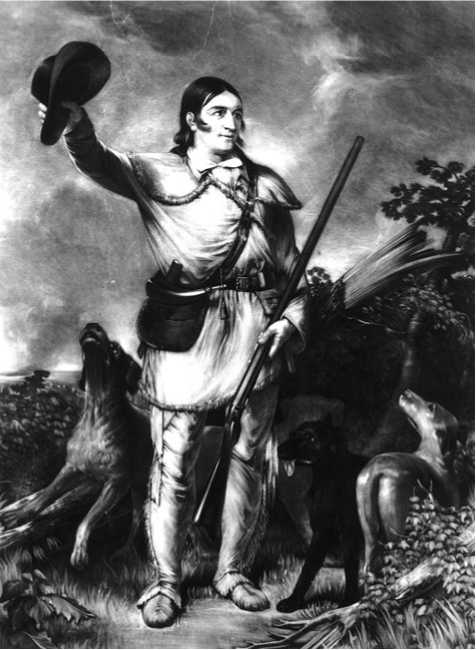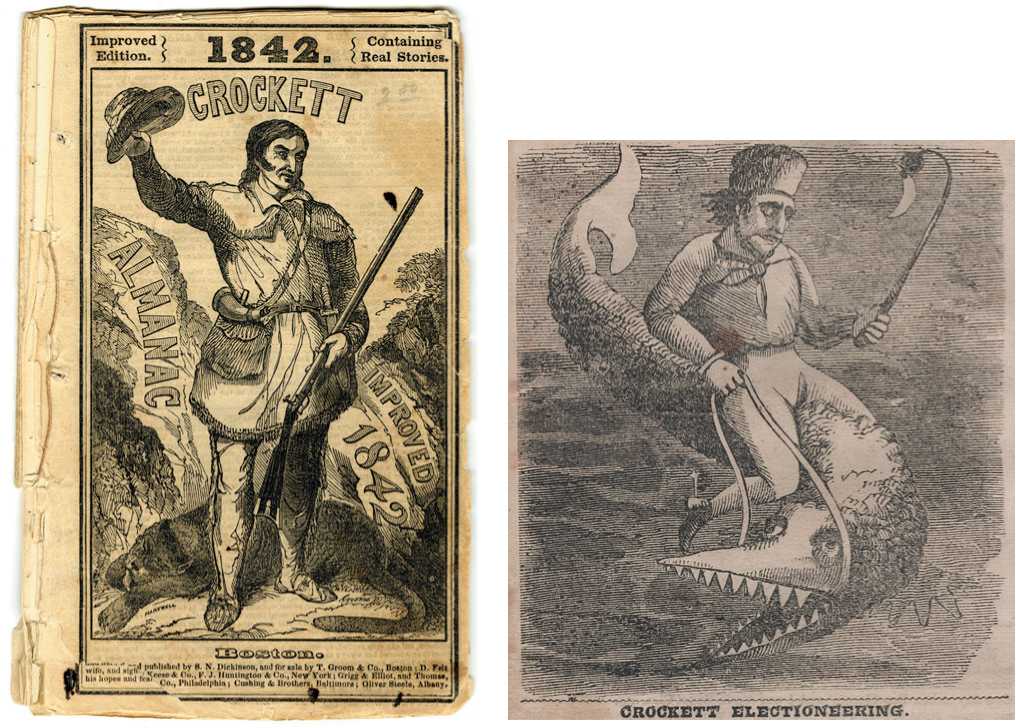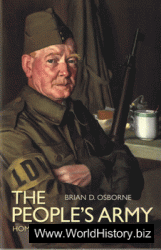Davy Crockett, the myth, is known better than the man, who was born David Crockett in 1786 in a cabin in hardscrabble east Tennessee. John Crockett, his father, borrowed money to buy cheap frontier land and seldom repaid his creditors. When a passing Dutchman said he needed help to drive his cattle to market in Virginia, John proposed he take on David as a "bound boy"to help out. David was twelve.
After delivering the cattle to Virginia, the driver declared that David's term of service was not over. The boy pretended to accept the arrangement, but after several weeks he sneaked away in a snowstorm; two months later he was back home in Tennessee.
The next fall his father enrolled David at a small country school. But after beating up another boy, he played hooky, fearing the wrath of the schoolmaster. When his father learned of his son's truancy, he came after the boy with a hickory stick. David hightailed it into the woods.
He was gone for over two years, wandering through Tennessee, North Carolina, Virginia, and Maryland. He moved from town to town "to see what sort of place it was, and what sort of folks lived there."He mostly did odd jobs on farms for twenty-five cents a day. When he showed up back home two years later, his father, near bankruptcy, bartered David's labor to settle the debts with various creditors.
Soon young Crockett's thoughts turned to girls, few of whom had much interest in such an uncouth boy. Crockett could not even write his name. So he broke free from his father and made his own deal with a local schoolteacher, bartering his labor for board and instruction. The arrangement lasted for six months, Crockett's only formal schooling.
Shortly afterward he attended a "stomp down"—a community-wide harvest festival with games, music, and dancing—where he met Polly Finley,"a very pretty" Irish girl. But proper courtship required that the man possess a horse. How else could he visit his date and manage a farm? For six months David worked in exchange for a horse. Then he rode out to Polly's house. Within a few months they were married. Polly's parents gave the couple two cows. Crockett rented a nearby farm.
But Crockett proved to be a poor farmer. Time and again he fell into debt, lost his farm, and moved to cheaper land farther west."I found that I was better at increasing my family than my fortune," he observed: He and his wife had three children. In 1813 they took possession of land deep in Creek territory, near the Alabama border.
The timing was poor. By then, the War of 1812 had spread to the frontier, as Tecumseh, the Indian leader, incited Indian uprisings throughout the West. In Alabama, Creeks attacked and overran Fort Mims, killing hundreds of soldiers and settlers. In response Crockett enlisted in the Tennessee militia. He served under Andrew Jackson, participating in the slaughter of score Indians at Tallusahatchee and Horseshoe Bend, Alabama."We shot them like dogs," Crockett noted.
After returning to Tennessee, he was elected magistrate for Lawrence County, a rough frontier district. Again, his farm failed; but the woodsy region was thick with game and Crockett was accurate with a long rifle. He killed deer, wolves, panthers, alliga-tors and, in one winter alone, 105 bear. Soon tales of Crockett's hunting prowess spread throughout the region.
In 1821 Crockett was elected to the Tennessee legislature, the first of many victories. When opponents snickered at his handmade trousers, homespun expressions, and inaccurate spelling, Crockett joined in, underscoring his commonness—and thereby endearing himself to voters. Once, accused of telling lies about an opponent, Crockett conceded that he had. But therein lay the difference, he explained, for he truthfully admitted his lies while his opponent did not. The crowd roared. In 1826 Crockett was elected to the House of Representatives.
Newspapermen delighted in the spectacle of the rough frontiersman in the nation's capital. They reported that at a White House dinner Crockett drank from the finger bowls and accused a waiter of trying to steal his food.
In Congress, Crockett's key issue—indeed, the only one he pursued with much passion—was cheap land for frontier farmers."The rich require but little legislation," he said."We

This 1839 engraving of Davy Crockett was based on an earlier painting.

These pages are from the Crockett Almanacs—the first comic books. Published by various printers and authors, they exploited Crockett's name and made it even more famous.
Should, at least occasionally, legislate for the poor."Such positions aligned him with the Jacksonian Democrats—the party of the common man.
But in 1830 Crockett broke with Jackson over the removal of Indians from the South. Although Crockett readily acknowledged that he had fought to "kill up Indians,"he thought it wrong that "the poor remnants of a once powerful people"should be driven from their homes. He voted against the Indian removal bill, the only member of the Tennessee delegation to do so. In the next election Jackson, furious, campaigned against Crockett:"I trust your Congressional District will not disgrace themselves longer by sending that profligate man Crockett back to Congress."Crockett's frontier constituents, too, wanted to be rid of the Indians. Crockett lost the election.
But by then his fame had spread. Newspaper editors seized on the story of the rough-hewn, bear-killing frontiersman. An 1831 play entitled The Lion of the West, based on Crockett, was performed in New York and London. Publishers found an eager audience for books about Crockett: some celebrated him, others lampooned him, but all exaggerated his exploits. The Crockett Almanacs—the first comic books—told of how Crockett rode his pet alligator up Niagara Falls, skinned Indians "the natural way, with his teeth,"and indulged in insatiable and exotic sexual appetites. Tens of thousands were sold.
After seeing others make money off his celebrity, Crockett published several books of his own. In 1833 he was reelected to Congress. There was talk of his running for president on a Whig ticket, allowing that party to steal the "common man" claims of the Jacksonians. In 1835,however, Crockett was defeated for reelection to Congress by several hundred votes. Thereafter, always on the lookout for cheaper land, he told the voters of Tennessee,"you may all go to hell and I will go to Texas."
Several months later, toting his long rifle, Crockett rode into the Alamo in Texas, then a part of Mexico. Thirteen days later history caught up with the legend of Davy Crockett— and perhaps surpassed it. (See Re-Viewing the Past, The Alamo, pp. 316-317.)




 World History
World History









